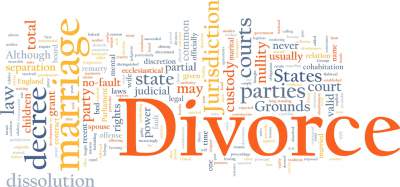Divorce and Bankruptcy
|
Divorce can be one of the most difficult time in any persons life. Even worse, divorce can leave one spouse with a mountain of debt from their ex that they simply can’t afford any longer, whether from credit cards or a mortgage. An all too common tool that a spouse will use in this case is to file for bankruptcy protection. This can leave the other spouse holding the bag that should have been joint debt. That being said, domestic support obligations are not discharged in bankruptcy. The end result can mean timing is everything and knowledge and planning is required to protect oneself!
|
Filing bankruptcy is a very common outcome for people getting divorced or even after divorce. Further, the intersection of divorce and debt has its own nuances in the world of bankruptcy. People ask me all the time what should come first: divorce or bankruptcy? While it always depends on the circumstances of each individual, more often than not, it’s better to wrap the divorce up first. One, this is general opinion: everyone’s situation is unique and needs to be game-planned. Sometimes, our law firm is involved during the entire divorce process, whether bankruptcy is filed before or after. Second, it’s important to note that divorce is not simply “you go away”. Often, there are issues involving property division and Spousal/child support. If you are considering bankruptcy in conjunction with a divorce, it’s vitally important to consult with a bankruptcy attorney to help strategize. Speaking of….
The second most common question I receive regarding bankruptcy and divorce regards child support and alimony. Whether you receive or pay it, the new 2005 Bankruptcy Code ensures that alimony and child support payments must continue and can’t be discharged by a bankruptcy filing. Thus, if your ex should file bankruptcy, which could be a good thing for you: he/she will no longer have other debts EXCEPT the spousal/child support obligations. He/she should be able to better afford them!
Lastly, I’m often asked if a couple that is planning divorce, but are still married, can file bankruptcy together? The answer is technically ‘yes’ and is fairly common. The Bankruptcy Code allows married couples to file one (1) “joint” bankruptcy. So, yes, any couple that remains married can file a joint bankruptcy, which typically means less fees and costs. With that said, each attorney has to weigh the potential for conflict in a situation like this to determine whether or not he/she feels comfortable representing both spouses. While intuitive, the more agreeable the couple is, the less potential for conflict.
As always, this intersection of bankruptcy and divorce can be difficult and you should consult an attorney as soon as possible to understand how best to protect yourself from being left responsible for all the marital debt. Feel free to call us for a consultation at 704-493-6851.
The second most common question I receive regarding bankruptcy and divorce regards child support and alimony. Whether you receive or pay it, the new 2005 Bankruptcy Code ensures that alimony and child support payments must continue and can’t be discharged by a bankruptcy filing. Thus, if your ex should file bankruptcy, which could be a good thing for you: he/she will no longer have other debts EXCEPT the spousal/child support obligations. He/she should be able to better afford them!
Lastly, I’m often asked if a couple that is planning divorce, but are still married, can file bankruptcy together? The answer is technically ‘yes’ and is fairly common. The Bankruptcy Code allows married couples to file one (1) “joint” bankruptcy. So, yes, any couple that remains married can file a joint bankruptcy, which typically means less fees and costs. With that said, each attorney has to weigh the potential for conflict in a situation like this to determine whether or not he/she feels comfortable representing both spouses. While intuitive, the more agreeable the couple is, the less potential for conflict.
As always, this intersection of bankruptcy and divorce can be difficult and you should consult an attorney as soon as possible to understand how best to protect yourself from being left responsible for all the marital debt. Feel free to call us for a consultation at 704-493-6851.

